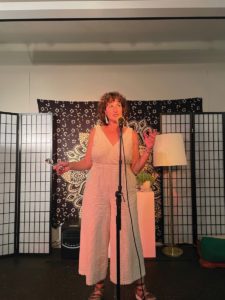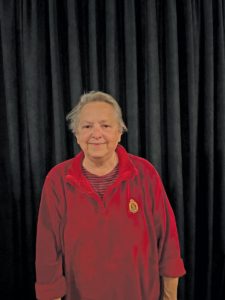The audience hummed with anticipation on Tuesday night last week at Provincetown’s WOMR Davis Space. They were waiting for Vanessa Vartabedian, the creator of the Mosquito, to take the stage. The Mosquito is the Outer Cape’s story slam — a type of storytelling performance in which audience members sign up at the door to tell five-minute true stories on a predetermined theme.

Last week’s theme was “miscommunication.” The Mosquito’s themes are deliberately vague (past ones include “flying high” and “love stories”) so as to be moldable to the experiences of all participants.
Soon, Vartabedian appeared, striding toward the microphone. The swarm went wild. This is the ninth season of Mosquito story slams, Vartabedian says. Whereas other story slams are competitions with winners, the Mosquito steers away from gamification. It’s simply about promoting positivity, she says.
Ten years ago in Los Angeles, Vartabedian first encountered the Moth, perhaps the most popular story slam. A global organization, the Moth hosts storytelling events, a popular podcast, and educational opportunities across the world. In L.A., Vartabedian says, she started going to the slams twice a week. The events had a theme, a five-minute limit, and an audience-chosen winner. Vartabedian was enamored. In the city, she says, the events fostered real community.
Vartabedian has been producing and performing theater on the Outer Cape during the summers since 1996. She moved to Truro full-time a few years ago, first working as a media and video production teacher at the Provincetown I.B. Schools and now as executive director at Provincetown Community Television. Back in 2014, she says, she knew something like the Moth was missing from the Outer Cape’s cultural scene.
After contacting the Moth for permission, she created the Mosquito; her horrendous bug experiences in outdoor theater served as inspiration for the name.
Operating during the summer from the WOMR Davis Space in Provincetown and from Wellfleet Preservation Hall, the Mosquito was an instant success, Vartabedian says. Tourists and locals alike had stories to tell. After a few years, she realized the Mosquito could work year-round.
At last week’s slam, a dozen audience members ranging from the teenaged to the elderly signed up at the door to tell their stories. Nervous first-timers (lovingly called “skeeters” by Vartabedian) wrung their hands, muttering last-minute preparations. Mosquito veterans looked bolder.
Outside, 72-year-old Michelle Crone of Provincetown said that she was “not nervous at all.” She said she had told many Mosquito stories before. Using a handmade wooden cane, she made her way to the entrance.
“This story is big-time lesbian,” she said, laughing.
During the show, Vartabedian pulled names out of a neon-green mosquito net. Crone was pulled second. Onstage, she worked the crowd, delivering lines with easy confidence, moving the audience from raucous laughter to heavy sighs.
Her story began in the ’70s, when she traveled with a coven of fellow lesbians from the U.S. to the Caribbean and back. They were trying to establish their own country. (That didn’t pan out.) All of them had adopted the last name “Crone” to spite the patriarchy, which looked down on witchy old women. The Crones advocated environmental justice, participated in Lakota drum circles, and lived at a women’s festival in the Midwest, where they encountered a woman who was a “healer” and who Crone also added was “an alien.”

The story’s miscommunication began with a call from a New York hospital saying Crone’s mother was dying. When she got there, she realized that the person on the deathbed was actually her grandmother — the woman in the world she was closest to. Her grandmother told her that she had begun ascending and saw a relative who said it wasn’t her time. In the end, Crone’s grandmother didn’t die — at least, not at that moment. The story was heavy, but Crone delivered it with a certain lightness.
Other stories were more straightforward: one woman related her mortifying mishaps in the business world. During a meeting with an important client, she said she looked forward to their “post-partum” (she meant “post-mortem”). Years later, after an internship, she thanked her employers for letting her be a gadfly (rather than a fly on the wall).
Other stories were about Maya Angelou, sickness, gender identity, glacial ice, and more. In the small, inviting space, speakers took the microphone one after the other. The audience applauded uproariously every time.
Although the organization is small, run only by Vartabedian and her co-host and co-producer, William Mullin, the fan base is large.
“People keep coming back,” Vartabedian says. “Our buzz is still alive.” Mosquito storytellers are brave, she continues. They express their vulnerability in the spotlight.
The Mosquito will hold story slams every week this summer. Vartabedian encourages everyone to give it a shot. She says that storytelling is a skill learned only through practice.
“The vulnerability is beautiful,” says 64-year-old Carol Bergen, who was in the audience last week. She says she sleeps in Truro, but her heart is in Provincetown. Waiting outside the Davis Space before the show, she smiles, adding, “These events are empathy on the stage.”
